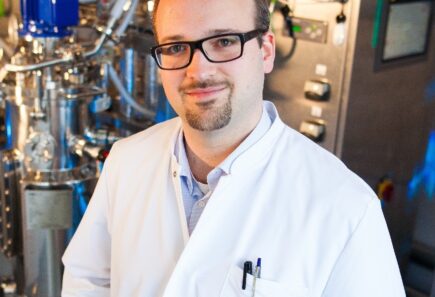The alternative protein research ecosystem in Germany, Austria and Switzerland
With its economic power and a world-class reputation for scientific excellence, the DACH region is well-positioned to lead protein diversification in Europe. This overview maps the scientific funding, research, and talent driving the alternative protein ecosystem across Germany, Austria, and Switzerland. Dive into the data, discover key players, and explore how this powerhouse region is shaping the future of sustainable food.
Dieser Artikel ist hier auch auf Deutsch verfügbar.
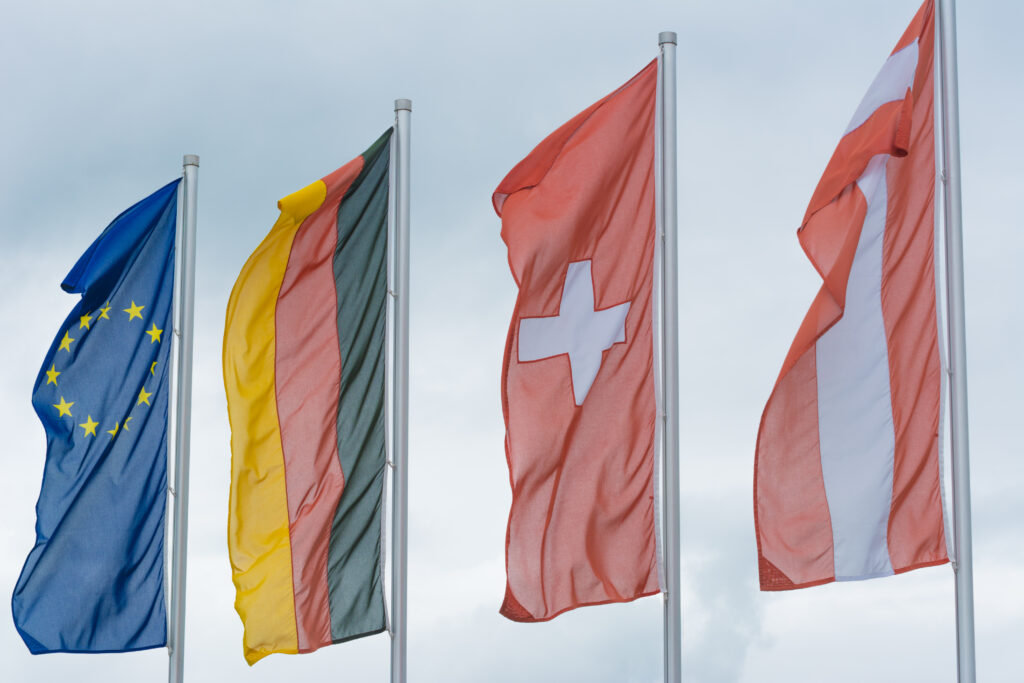
On this page:
Germany, Austria, and Switzerland are long-standing leaders in research and innovation (R&I) in Europe and beyond. Recognised as “strong innovators” by the European Commission, Germany and Austria consistently outperform most EU countries in R&I, while Switzerland has led global innovation rankings for over a decade.
This puts these countries in a strong position to lead scientific advancements in plant-based foods, cultivated meat and fermentation. Yet, while recent reports by GFI Europe show growing momentum in alternative protein research, especially in Germany and Switzerland, overall the field remains fragmented in the region. Scattered efforts, limited visibility and a lack of coordination make it difficult to discover white spaces, build lasting networks or attract new researchers – slowing progress in a critical area of food innovation.
This page offers a bird’s eye view of the current state of the alternative protein scientific ecosystem in the DACH region. It aims to highlight key trends, promote better knowledge-sharing and collaboration, and recommend how the region can further bolster its leadership in the global protein transition.
Headline statistics
The DACH region is helping to set the pace for sustainable food development across Europe. GFI Europe has recently published a series of reports on the European scientific ecosystem analysing key metrics used to measure R&I developments: scientific funding, publications, and patents.
These reports give high-level insights into how the DACH region compares with the rest of Europe. These are the most exciting findings:
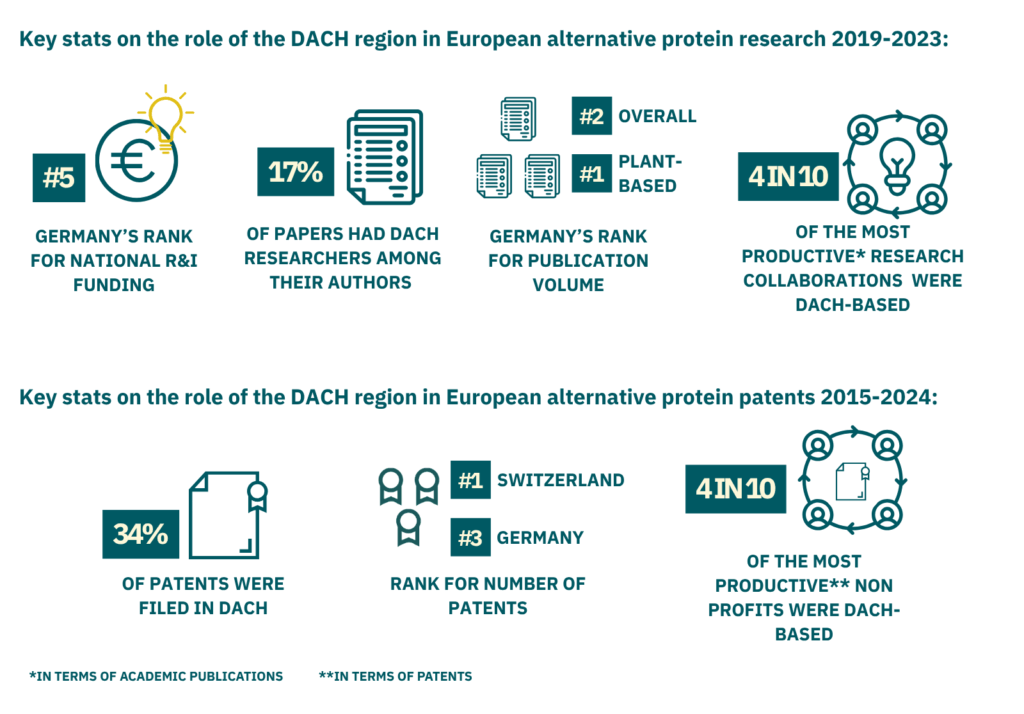
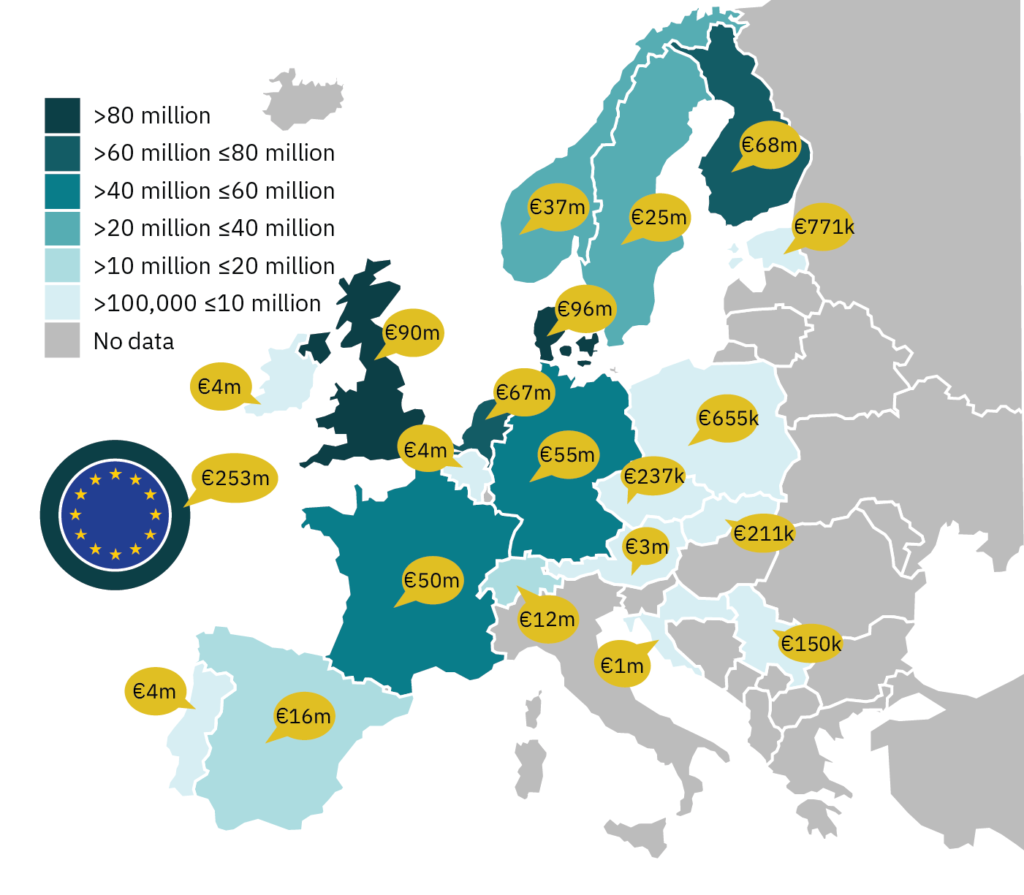
Funding: Public and nonprofit alternative protein R&I investment in Europe (January 2020-April 2024). Public and philanthropic funders from the DACH region awarded almost €70 million to alternative protein research.
Publications: Heat map of the most productive European countries in alternative protein research in the years 2010-2023 inclusive as measured by absolute unique publications. Germany comes in second place, after the UK.
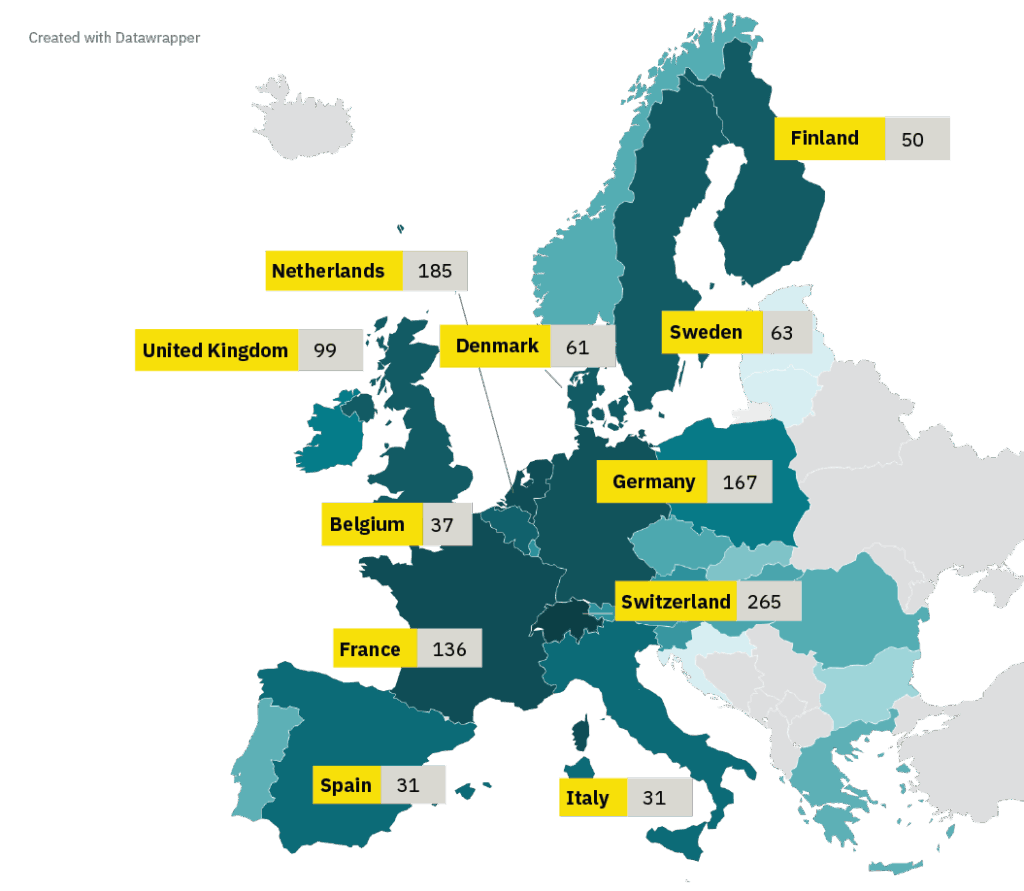
Patents: Total number of alternative protein patents published in the 10 most productive European countries (January 2015-December 2024 inclusive). Switzerland comes in first place, Germany third.
The DACH research landscape
The alternative protein research ecosystem in the DACH region is shaped by a broad and diverse network of institutions. In recent years, several of these have emerged as key innovators within the wider European and global landscape. At the same time, much of the research still occurs in isolated projects across different disciplines, where individual research groups contribute their specialised expertise to the field. This combination makes the region a fertile and dynamic hub for innovation – but also one that requires greater coordination to avoid duplicative work, collaboration, and knowledge exchange to realise its full potential.
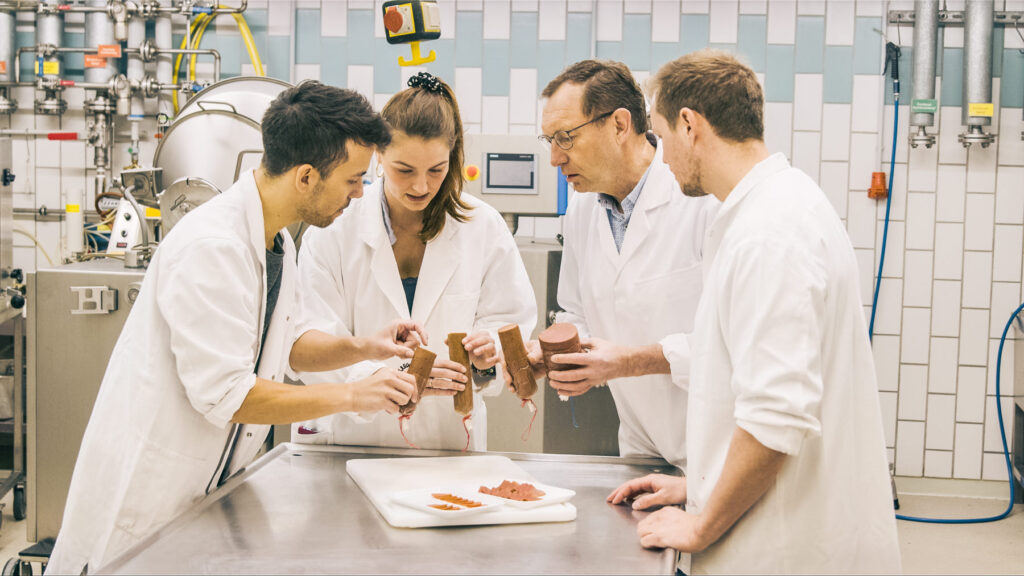
Research by alternative protein pillar
According to GFI Europe analyses, more than 400 researchers have contributed to over 240 publications on alternative proteins since 2019 in the DACH region. A majority of this research output stems from Germany, the largest of the three countries. However, although neighbouring Switzerland may have produced fewer publications in absolute terms (>60 since 2019), relative to its population size, it is punching way above its weight.
Alternative protein publications in the DACH region were dominated by plant-based protein research between 2019 and 2023. The number of publications has grown each year, though the growth rate has significantly decreased in 2023.
In the following sections, we give a (non-exhaustive) overview of institutions to look out for, as well as key research projects in the local ecosystem.
Did we miss anything? If you are aware of institutions, landmark projects, funding, or other important data that is missing, please let us know via europe@gfi.org, or submit the information directly to our open-access databases like the research grants tracker or the researcher directory.
Plant-based

“Germany has built a strong foundation in plant protein research – what once started as a niche topic has become a key pillar of food science and innovation. To drive meaningful change in our food system, we must strengthen interdisciplinary collaboration within Germany and beyond, aligning academic, industrial, and political efforts. The greatest potential lies in the white spaces – in overlooked crops, neglected research questions, and by-products waiting to be revalued. Applied research and a clear focus on plant-based resources are not just a strategic opportunity – they are a shared responsibility for a sustainable future.”
Professor Ute Weisz, Technical University of Munich
Like in many other regions, plant-based protein research is by far the most developed academic field in the DACH region. Across all three countries, over half of all publications and 80% of all patents filed in the DACH region concern plant-based technologies between 2019 and 2023. Institutions like the University of Hohenheim, the Fraunhofer IVV, or the TU Munich are among the most active public research institutions across Europe.
Plant-based protein research in the DACH region focuses on the following broad objectives:
- the characterisation and optimisation of crops, both native (like local legume breeds) and non-native (like mung beans)
- the characterisation of protein ingredients, as well as the optimisation of nutritional and technofunctional protein properties through improved upstream processing (e.g., fractionation)
- improved downstream processing, most prominently the optimisation of texturization processes like extrusion
- ingredient development for protein end products (e.g., gelling agents).
A significant share of plant-based protein research in the DACH region does not necessarily focus on a specific food application. Another major portion of research is dedicated to plant-based dairy and cheese alternatives. Meanwhile, research targeting bottlenecks for plant-based meat and fish applications is steadily increasing. A similar shift can be observed with regard to raw materials: While staple crops like lentils, peas, and soy have traditionally been the main focus, there is growing interest in exploring new protein sources such as oilseeds (e.g., hemp) or even grass, as well as in valorising agricultural sidestreams – all with the aim of creating a more sustainable value chain.
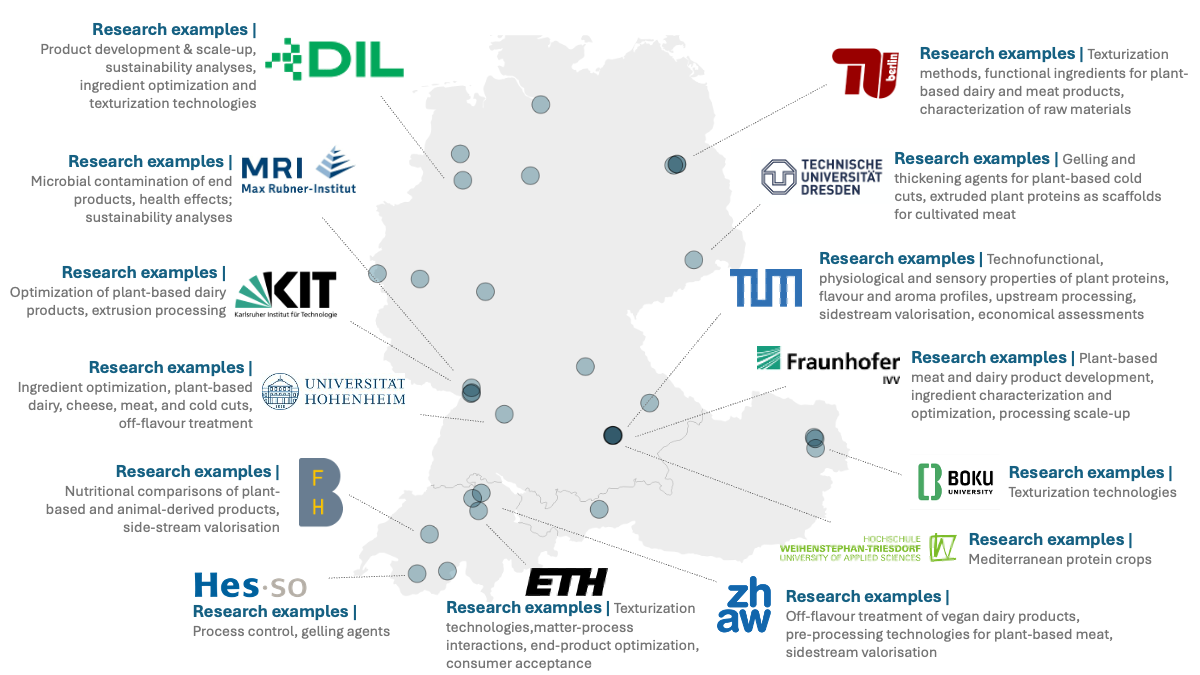
A non-exhaustive overview of public and non-profit research facilities working on plant-based protein technologies (with a focus on the natural sciences).
Current plant protein consortia
Missing a major project? Make sure to let us know via our research grants tracker.
NewFoodSystems
The innovation space NewFoodSystems was one of the biggest German consortia on transforming the German food system, bringing together more than 50 partner organisations from academia, industry, and the wider society. One prominent sub-project characterised the techno-functional properties of more than 90 commercially-available plant protein ingredients. While the consortium officially ended in 2024, it will host a final three-day conference in October 2025.
ProxIMed Prima
The ProxIMed consortium, funded through the EU PRIMA programme, is a collaborative initiative comprising 17 partners across 10 countries, led by the Weihenstephan-Triesdorf University of Applied Sciences in Weihenstephan. The project aims to revolutionise the Mediterranean food system by introducing sustainable proteins, including plant-based sources and microalgae. The project focuses on developing alternative protein products through eco-friendly processing technologies, tailored to diverse regional needs, and assesses their environmental, economic, and social impacts.
Plant³
The Plant³ research consortium in northeastern Germany is a regional innovation alliance led by the University of Greifswald, aiming to transform Mecklenburg-Vorpommern into a model bioeconomy region by refining plant-based raw materials from land, peatlands, and marine sources into high-value products. The consortium is funded by the German Federal Ministry of Research, Technology and Space (BMFTR) through the WIR! program, with up to €15 million allocated to support bio-based structural change in the region. Within Plant³, the sub-project LeguLand investigates native legume varieties, such as white lupine, with high protein yields and favourable agronomic traits.
Giant Leaps
Giant Leaps is an EU-funded consortium working on safety, nutritional, allergenicity and environmental assessment to promote the use of alternative proteins and dietary changes. A key goal is to improve how the environmental impacts of alternative proteins are evaluated and communicated to stakeholders, and to focus on alternative proteins that have the greatest chance of consumer uptake. Among a handful of DACH collaborators from academia and industry are ETH Zurich – experts in consumer behavior – investigating the current state of consumer attitudes towards different protein sources, ETH experts for sustainable food processing investigating the nutritional quality of plant-based meat and dairy products, as well as DIL Food Data specialists leading Giant Leaps’ work on a data integration platform.
The Edible Soft Matter
The Edible Soft Matter (ESM) project is a EU-funded initiative – whose partners include the Food Process Engineering group at ETH Zurich – aiming to advance the development of plant-based foods through the integration of soft matter physics and food science. Its primary objective is to gain a mechanistic understanding of the multiscale structure-function relationships in edible soft materials, thereby facilitating the creation of innovative, sustainable, and appealing plant-based food products.
Fermentation

“For millennia, we have used microorganisms like yeast, bacteria and fungi to produce such products as beer, bread, wine, cheese, and yogurts. Today, fermentation technologies turn microorganisms into biofactories – converting inputs like sugar, agricultural waste like molasses or even CO₂ into ingredients that shape the future of alternative proteins. Fermentation can improve plant-based meat’s texture and aroma or supply affordable, sustainable and locally sourced inputs for cultivated meat. The DACH region’s legacy in industrial biotech can power this innovation. To unlock alternative proteins’ potential, we must secure support from the public, funders, and policymakers..”
Dr. Aleksandra Fuchs, Austrian Centre for Industrial Biotechnology (acib)
Fermentation-based approaches currently account for approximately one-fifth of alternative protein research activity in the DACH region, as measured by scientific publications – but the field is growing rapidly.
The vast majority of this research focuses on biomass fermentation, particularly the cultivation of protein-rich and nutritionally advantageous microorganisms such as microalgae and mycoprotein (fungal biomass). Key research areas include improving cultivation efficiency – e.g., through urban or vertical farming techniques – and the usage of more sustainable feedstocks such as agricultural byproducts. Researchers are also exploring novel or enhanced microbial strains with promising nutritional or functional properties for use in alternative proteins.
A smaller but rapidly emerging area of focus is precision fermentation. This usually involves engineering microorganisms like yeast or bacteria to produce specific proteins or other biomolecules that can serve as high-value ingredients in final products. DACH precision fermentation researchers often target bioprocess optimisation, downstream processing to increase yields, exploring alternative feedstocks (e.g., CO₂) and microbial strain development to enhance substrate utilisation and environmental performance. For example, researchers at the TUM are developing an expression platform to produce egg proteins – addressing challenges plant-based alternatives struggle with, such as replicating techno-functional properties of egg yolk and egg white. Precision fermentation also holds promise for cultivated meat by enabling the production of functional, animal-free growth factors. Another share of projects involves traditional fermentation to enhance the nutritional value and technofunctional properties (such as texture and flavour) of plant-based products (especially milk and cheese).
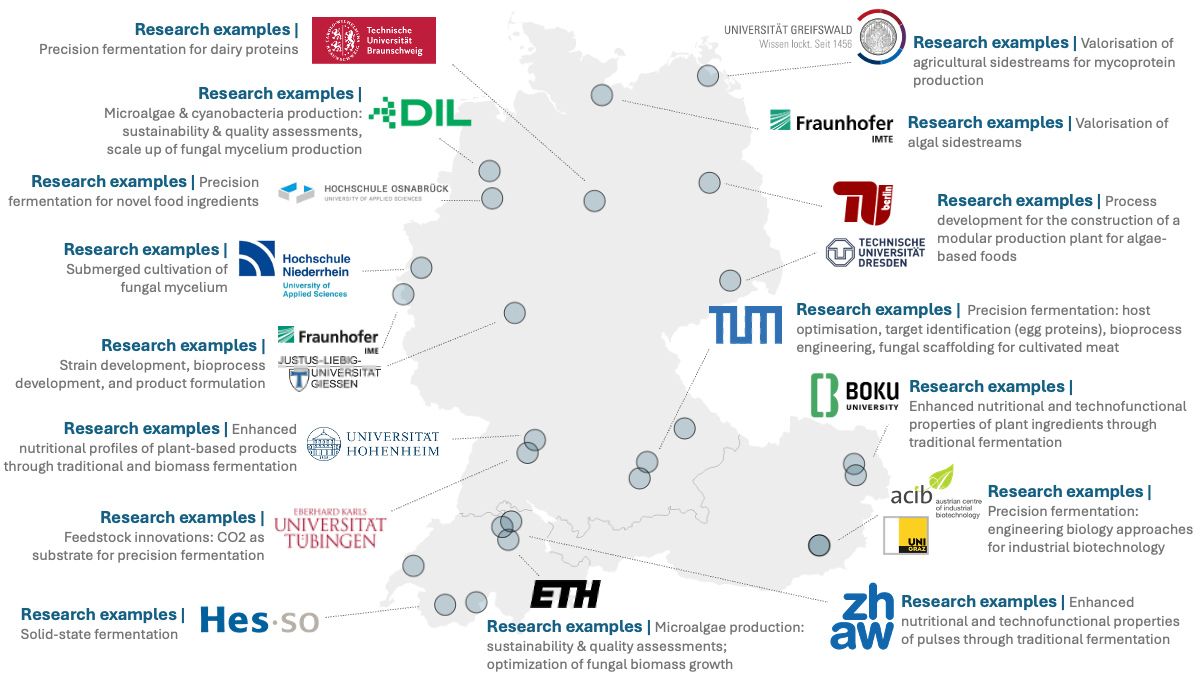
A non-exhaustive overview of public and nonprofit research facilities working on fermentation-made alternative protein technologies (with a focus on the natural sciences).
Current fermentation consortia
Missing your big project? Make sure to let us know via our research grants tracker.
MycoPea
MycoPea is a consortium led by the Fraunhofer Institute IME, working on valorising sidestreams from legume fractionation as a feedstock for the cultivation of fungal mycelium through biomass fermentation.
Plant³
Within the Plant³ consortium, the sub-project APPLE utilises apple pomace to cultivate fungal mycelium as a sustainable new protein source.
Ingrain.nrw
Ingrain.nrw is a consortium investigating how circular economy approaches could revitalise Western German regions that underwent structural changes during the decline of key sectors like coal mining or the textile industry. The Competence Centre for Applied Mycology and Environmental Studies (KAMU) at Hochschule Niederrhein University of Applied Sciences leads efforts to cultivate fungal mycelium for human consumption using regional agricultural sidestreams.
NewFoodSystems
The innovation space NewFoodSystems (ended in 2024) comprised multiple fermentation projects, from the cultivation of microalgae to the development of meat, cold cut and yoghurt products from fungal mycelium using oat sidestreams as feedstocks.
Proteins4Singapore
This project is a collaboration between the Technical University of Munich in partnership with three leading universities in Singapore. The consortium is working on the cultivation, processing and ecological evaluation of nutrient-rich biomass from algae as well as soy protein from indoor farming for the industrial production of novel foods. The researchers also use so-called reverse engineering approaches. The aim is to secure nutrient-rich, functional and safe proteins for Singapore.
Urban Microalgae-Based Protein Production
This consortium led by the Singapore-ETH Centre at ETH Zurich investigated the integration of photobioreactors into urban infrastructure to generate sustainable biomass. This research has led to innovative product developments such as microalgae-based calamari.
Cultivated meat and ingredients

Although public debate around cultivated meat is very active in the DACH region, the research community remains small and relatively nascent. Only 12.6% of alternative protein publications from DACH institutions between 2019 and 2023 focused on cultivated meat and ingredients, with many stemming from consumer or social science fields rather than technical R&I.
Still, promising research themes are emerging. A key focus is on replacing animal-derived components in cell culture media with more sustainable, cost-effective alternatives. The Research Institute for Farm Biology, which led the first German cultivated meat consortium CellZero Meat, developed an animal-free medium from algae and is scaling its bioprinting process. In Austria, the Austrian Centre of Industrial Biotechnology (acib) is advancing media optimisation and is a partner in the EU-funded FEASTS project, alongside TU Munich.
Additionally, institutions like ETH Zurich and the University of Reutlingen are applying their biomedical tissue engineering expertise to develop innovative cultivation technologies. For example, the Kluger lab at the Institute of Interfacial Process Engineering and Plasma Technology (IGVP) at the University of Stuttgart (previously University of Reutlingen) leads several interdisciplinary efforts on cultivated meat and fish in public-private partnerships. While funding and institutional support lag behind some European peers, a foundation of technical excellence and growing international collaboration mean the DACH region is well-positioned to play a meaningful role in advancing cultivated meat research.
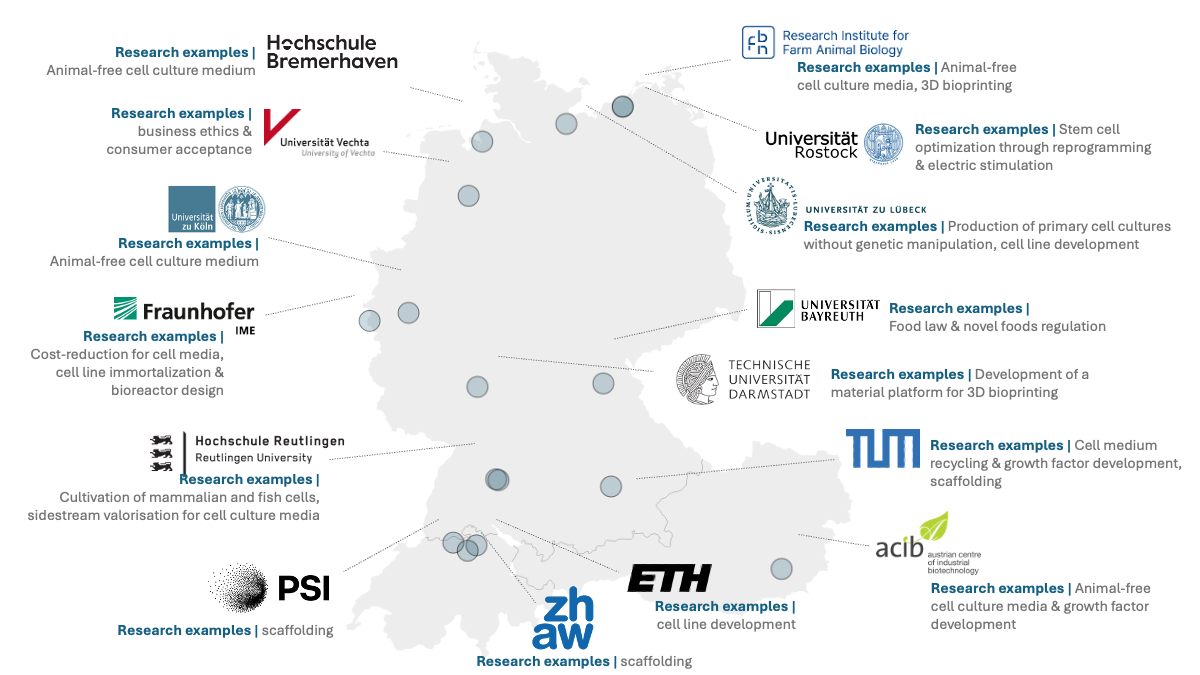
Current cultivated meat and ingredients consortia
Missing your big project? Make sure to let us know via our research grants tracker.
INVERS
The INVERS project led by Reutlingen University explores the technological, regulatory, societal, and economic aspects of developing cell-based fish products. A key technological aim is to develop sustainable, high-quality cell-based fish products by establishing fat precursor cells from salmon-like fish species for cultivated seafood production. Another sub-project at the University of Vechta focuses on understanding consumer acceptance and market potential of these cultivated seafood alternatives in Germany. This research is funded by the Innovation Funding Programme of the German Federal Ministry of Agriculture, Food and Regional Identity.
CellZero Meat
The first German cultivated meat consortium CellZero Meat, led by the Research Institute for Farm Animal Biology (FBN), has developed an animal-free cell medium based on algae ingredients, and successfully used it to cultivate animal muscle, fat, and connective tissue cells that can be used to produce meat products via 3D printing. The consortium was funded by the German Federal Ministry of Research, Technology and Space. Although the funding period ended in 2024, the consortium is still building on their findings.
Mostime
Together with the cultivated meat company Innocent Meat, the University Medical Centre Rostock is propagating adult porcine myo-satellite cells – stem cells derived from living pigs – into muscle, fat, and connective tissue. A key focus is improving the differentiation of these cells into structured meat tissue, a critical step for achieving realistic meat texture and flavour, which is currently hampered by costly and inefficient growth media. The consortium uses alternative methods such as directed cellular reprogramming and electrical stimulation to improve differentiation efficiency and eliminate the need for animal-derived inputs, aiming to make cultivated meat viable for mass food production.
FEASTS
The FEASTS project (Fostering European Cellular Agriculture for Sustainable Transition Solutions) is an EU-funded research initiative focused on advancing the development and integration of cultivated meat and seafood into sustainable food systems. Besides the technological challenges, it focuses on the environmental, nutritional, ethical, and regulatory aspects of cellular agriculture. FEASTS partners include leading cultivated meat research institutions in DACH, such as acib, TU Munich, and the Fraunhofer IME.
Leading research institutions
A handful of key institutions are leading alternative protein innovation in the DACH region in terms of publications and, in some cases, patent outputs. These centres combine diverse research approaches with strong regional networks and a clear focus on sustainability. They also play a proactive role in technology transfer, actively bridging academic research and industry through commercial partnerships, spin-offs, and innovation hubs.
ETH Zurich
ETH Zurich is a key player in alternative protein research, ranking second in Europe for alternative protein patents from public institutions. It is also a leading European university regarding academic publications on fermentation-derived proteins. While ETH is most renowned as a stronghold of machine engineering expertise, it has also developed a strong portfolio of global food systems and nutrition research. Key research groups and initiatives include:
Plant-based
The research groups for Food Process Engineering, Sustainable Food Processing and Food Structure Engineering work on improving texture, taste, and nutrition in plant-based meats, especially by improving our understanding of material-processing interactions. A key process they focus on is extrusion – a technology underlying most plant-based meat products in today’s supermarkets. The researchers work to understand extrusion processes better to ultimately be able to adapt and improve it for a broad range of raw materials, including various plant proteins and microalgae. In addition to extrusion, research is also being conducted into other processes, such as gas-based foaming technologies for texturising mushroom mycelium. The aim is to develop a scaffold which could add texture and nutritional value to plant-based foods. ETH researchers from the Sustainable Food Processing Laboratory and the Consumer Behavior Laboratory are part of Giant Leaps (see list of plant-based consortia above).
Fermentation
The Sustainable Food Processing group explores how to utilise the nutritional value and improve the production and processing of protein- and micronutrient-rich microalgae. The researchers are working with different microalgae species to explore their various technofunctional properties for different application purposes, and optimise processing for increased yield and bioavailability of important micronutrients (e.g., through microfiltration, pulse electric fields) . As part of the Singapore-ETH Centre and in partnership with the National University of Singapore, its Urban Microalgae-Based Protein Production project investigated the integration of bioreactors into urban infrastructure to generate sustainable biomass. This research has also led to innovative product prototypes such as microalgae-based calamari, produced via extrusion. Additionally, ETH researchers are part of HealthFerm, an international consortium co-funded by the EU investigating the health effects and consumer perception of novel fermented foods from cereals and pulses.
Cultivated meat and ingredients
The Laboratory for Regenerative and Muscle Biology uses its expertise in tissue engineering to develop innovative ways to create new cell lines for cultivated meat applications. They are working with different myoblasts, from bovine cells to fish. The researchers are also optimizing cell culture media the different cell lines.
Intra-university collaboration
A wide community of ETH researchers contributes to alternative protein research, with expertise hailing from different disciplines to cover topics such as sensory analyses and consumer behaviour. The World Food Systems Centre is a cross-departmental initiative bundling the ETH research community focused on food security and sustainability. One of its flagship projects “Novel Proteins for Food and Feed” is advancing microalgae cultivation and its applications, e.g. in soy- and pea-based meat products.
In recent years, the applied research at ETH Zurich has led to the founding of two plant-based meat and seafood start-ups, namely Planted Foods and Catchfree.
“At the ETH Zurich Sustainable Food Processing Lab, we are committed to advancing both local and global food systems. To sustainably nourish a growing global population, it is essential to explore a diverse range of protein sources for food – from familiar crops to novel sources like microalgae. Our approach emphasizes effective, interdisciplinary collaboration in food innovation, guided by principles of sustainability, economic viability, and consumer relevance.”
Professor Alexander Mathys, ETH Zurich
Technical University of Munich
The Technical University of Munich (TUM) is home to one of the DACH region’s most dynamic hubs for alternative protein research, centred at its School of Life Sciences in Weihenstephan. Several research groups are participating in department-wide collaborations. These are the key actors:
Plant-based
The Plant Proteins and Nutrition Lab leads work to understand how different processing methods affect the nutritional and functional properties of plant proteins, recently analysing over 90 commercial ingredients within the NewFoodSystems consortium. The neighbouring Food Process Engineering Lab focuses on advanced plant protein processing such as drying, fractionation, and texturisation technologies.
Cultivated meat and microbial fermentation
In 2022, TUM became the first university globally to establish a Chair for Cellular Agriculture, which now conducts innovative research in microbial fermentation and cultivated meat and ingredients, aiming to optimise process parameters in projects such as producing egg protein through precision fermentation, evaluating growth factors in cultivated meat production, or using fungal biomass to produce innovative cultivated meat scaffolds. The group is part of the Horizon Europe FEASTS project.
International collaboration
TUM researchers collaborate with Nanyang Technological University in Singapore through the Proteins4Singapore initiative. Among other things, they are investigating the advantages of technologies like reverse engineering, vertical farming, or additive manufacturing for sustainable algae and soy protein production.
University of Hohenheim
The Institute for Food Science and Biotechnology at the University of Hohenheim is a beacon of food and agricultural research in Europe. According to GFI Europe’s analysis of the European ecosystem, it is Europe’s second-highest publishing institution for alternative proteins. A wide range of research groups contribute to improving plant-based products, often through the use of traditional fermentation:
Plant-based meat
The Department of Food Material Science is led by Professor Jochen Weiss – the most productive alternative protein researcher (by publications) in our recent analysis. The team uses their expertise in material science, meat science, and structural analysis in a variety of applications, from improving plant protein concentrates to studying solidification approaches and using fermentation to develop plant-based cold cuts.
Innovating plant-based dairy, cheese, and egg
There is a significant emphasis on the improvement of plant-based milk, cheese and egg, e.g., through enzymatic treatment, extraction of flavours from new sources like mycoprotein, improved raw materials or novel processing to reduce fouling. Key research groups include the Departments of Biotechnology and Enzyme Science, Plant-Based Foods, Flavour Chemistry, and Soft Matter Science and Dairy Technology.
“At the University of Hohenheim, our alternative protein research is guided by a One Health perspective—recognizing that human and planetary well-being are deeply connected. We explore how to make sustainable proteins as delicious and appealing as conventional foods, how to upcycle food system by-products, and how to shift consumption patterns toward nutritious, low-impact diets. By answering these complex questions, we aim to shape a resilient, equitable, and sustainable food future.”
Professor Jochen Weiss, Head of the Department of Food Material Science, University of Hohenheim
Fraunhofer IVV
For over 15 years, the Fraunhofer Institute for Process Engineering and Packaging (IVV) has conducted research in the characterisation, optimisation and extrusion of a variety of plant proteins. As an applied research institute that regularly partners with industry players, Fraunhofer IVV provides an effective model for efficient technology transfer. It is one of the top publishing institutions in DACH, and a leading hub for IP generation in Europe. Its key initiatives include:
Plant-based proteins
The IVV has a variety of ongoing projects regarding the processing and functionalization of plant proteins for various applications. Most prominently, the IVV is co-creating a protein database characterizing commercially available protein ingredients as part of the NewFoodSystems consortium. In other projects, they are exploring innovative methods to process lentils and mung bean, and developing lentil-based egg foam. The IVV’s work on plant-based meat benefits from their substantial facilities for process and product development, most notably their scale-up facilities for extrusion processes.
Traditional fermentation for plant-based milk and cheese products
In various projects, the IVV has used or is using traditional fermentation processes to improve the quality of plant-based foods, e.g. to produce cheese flavors or to optimize fermentation and refinement processes for cheese alternatives.
Collaboration within the Fraunhofer Society
The IVV is leading the Future Proteins project, a consortium of six different institutes from the Fraunhofer Society aiming to develop methods of cultivating, extracting and processing a variety of protein sources.
International engagement
The IVV also regularly takes part in broader European research consortia, like the (completed) Smart Protein Project.
Fraunhofer IVV has seen a number of alternative protein spin-offs such as Endori, Neggst or Sunbloom.
“Fraunhofer IVV, we have been dedicated to plant protein research for over 30 years. We start at the source—understanding each protein’s properties, how they behave in processing, and their role in creating nutritious, appealing foods. Our work focussing on alternative protein sources such as plants, algae and fungi drives protein diversification as a path to a more sustainable food system while providing people with the eating experiences they love. As a hub for technology transfer, we focus on quality, safety and consumer needs to help bring better protein options to market.”
Christian Zacherl, Business Development Manager Food, Fraunhofer IVV
The German Institute of Food Technology (DIL)
The German Institute of Food Technologies (DIL) is another applied research institute sitting at the intersection of academia and industry. It is one of DACH’s top publishing institutions, focusing mostly on plant-based and fermentation technologies using a variety of protein crops and novel raw materials like microalgae, fungal mycelium or grass. Looking at a variety of protein sources, they publish a lot of work on extrusion technologies and sustainability assessments. Beyond that, the DIL serves a key role in bringing together research and its home state of Lower Saxony. Key topics of focus and initiatives include:
Plant-based meat
The DIL works on key processing technologies like extrusion at their pilot plant facilities. They are looking at different plant proteins such as pea or lentils. They also published work on the sustainability of extruded plant-based meat products and other meat analogs.
Biomass fermentation
In the BASOMEAT consortium, the team is currently extruding fungal mycelium for meat products. The DIL is also working on microalgae applications.
Regional collaboration and engagement
Together with local universities like the
University of Göttingen, the DIL created ZERN, a research and technology transfer network aiming to support the transformation of the agricultural and food system in Lower Saxony. One of its key projects aims to valorise grass protein for human consumption. DIL also contributed to a report on the state and opportunities of precision fermentation in Lower Saxony. This report is part of LI Food, the state’s Initiative for the Food Industry.
International collaboration
DIL is a partner in the EU consortium Giant Leaps.
The DIL has many collaborative relationships with industry partners, e.g., sharing a protein technology centre with Bühler and collaborating with start-ups like Kynda Biotech.
“The world needs a diverse range of sustainable, high-quality protein sources to feed a growing population. At the DIL, we work at the intersection of science and industry to assess the viability of alternative proteins—through systematic evaluation, technological innovation, and cross-sector collaboration. Creativity in both process design and protein choice is key to meaningful progress. We’re also committed to empowering the next generation of food innovators—because a sustainable protein future depends not just on technology, but on the people who will shape and scale it.”
Dr. Volker Lammers, Head of Research Platform Process Engineering, DIL
Spotlight:
Meet the researchers
More than 400 researchers in the DACH region have contributed to alternative protein scientific publications in the past 4 years. Meet some of the leading scientists and find out more about how their innovation contributes to a diversified protein supply and a more sustainable food system:
Scientific networks: bringing researchers together
The DACH region hosts a diverse alternative protein research landscape, making structured networking essential to share knowledge, identify collaboration opportunities and advance the field strategically.
Among the three countries, Switzerland is currently the only one with an open researcher network explicitly dedicated to alternative proteins: the Proteins4Future Innovation Group at Swiss Food Research. This group brings together researchers from biology, food technology, nutrition, and consumer science to explore sustainable protein sources – plant-based, fermentation-made, and cultivated – while emphasising holistic raw material use and innovative processing.

Beyond that, substantial networking and knowledge-exchange happens within
- Temporary research consortia, like NewFoodSystems on the national level or FLAVOURsome on the international level.
- Exclusive, time-bound networks like the PIONEER network, an initiative by the German Ministry for Agriculture, Food, and cultural identity aiming to increase connectivity between projects on alternative protein sources funded by the ministry (going beyond applications for alternative meat, seafood, dairy or egg products).
- Broader scientific networks not exclusively focused on alternative proteins, such as the Dechema Food Process Engineering working group, or cooperation networks like the Research Association of the German Food Industry (FEI).
- Broader regional initiatives like ZERN in Lower Saxony.
- Broader scientific boards like the Permanent Senate Commission on Food Safety of the German Research Foundation (DFG).
Know about alternative protein networking opportunities open to interested DACH researchers? Let us know via europe@gfi.org!
Talent & Education: The Alt Protein Project
Students are crucial for the growth of the alternative protein sector. The Alt Protein Project (APP) is GFI’s worldwide student-led initiative focused on transforming universities into hubs for alternative protein learning, research, and innovation. From undergraduates to doctoral candidates, students at all academic levels are the driving force behind the APP, which is gaining traction at universities globally.
In the DACH region, there are currently four APP chapters at some of the most prestigious institutions in Europe. Their work spans from awareness-building on campus and education over university programmes or webinar series, to student-led research initiatives. Click on their logos on the map to find out more about their work!
The DACH funding landscape

Public investment in alternative protein research is rapidly gaining traction in DACH, with funding from public funders and non-profit foundations more than tripling between 2020 and 2023 according to GFI Europe’s analysis of the European funding landscape. Funding for plant-based innovation is driving this effect, as all countries put a major emphasis on protein crops in their respective agriculture and food policy strategies. Still, only Germany is a top-10 country for funding alternative proteins in Europe.
Who is funding alternative protein research?
A key difference between the three DACH countries lies in who is funding alternative protein research: while most support in Germany comes from initiatives directly spearheaded by federal ministries, in Austria and Switzerland, it is the national research agencies that distribute third-party funding. Below is a short summary of what we know about funding structures.
Germany
According to GFI Europe’s research, Germany has emerged as a regional leader, with €54 million allocated to research projects between 2020 and April 2024. Three federal ministries are the leading drivers of alternative protein research.
The Federal Ministry of Food, Agriculture and Regional Identity (BMLEH)
The BMLEH has been the primary public funder since its 2021 announcement to fund innovation promoting the development and use of alternative protein sources for human nutrition, including plant-based sources, algae, fungi, cell cultivation, and insects. Key frameworks are
The Innovation Programme supports a wide range of technological and non-technological research projects on innovation in agriculture, food, and consumer health protection. This includes the INVERS project, an interdisciplinary consortium on cultivated fish fat cells.
The Protein Crop Strategy promotes the cultivation and use of domestic protein crops – most importantly legumes – to reduce import dependence and ensure a sustainable protein supply for food and feed. For example, the consortium SENSOJA is working on sensor-assisted breeding of new soybean lines with improved yields and resistance towards antibiotic stress. In 2024, the ministry announced a new protein strategy, expected in 2025.
The Federal Ministry of Economic Affairs and Energy (BMWE)
The BMWE is a big supporter of alternative protein research through public-private partnerships.
Most prominently, many academic researchers receive funding via the Industrial Collective Research Program (IGF), which is aimed at application-oriented, pre-competitive research projects of small and medium-sized enterprises. For example, the Technical University of Berlin is leading an IGF project on the development of extruded and 3D-printed scaffolds for cultivated meat.
Other relevant funding initiatives include the Central Innovation Programme for SMEs (ZIM), funding programme Industrial Bioeconomy, and the funding programme Innovation Competence (INNO-KOM).
The Federal Ministry of Research, Technology & Space (BMFTR)
In joint initiatives with the other two ministries, the BMFTR is funding a variety of projects under the umbrella of the National Research Strategy Bioeconomy 2030. As part of this programme, the BMFTR funded two of the biggest German research consortia on alternative proteins to date, NewFoodSystems and CellZero Meat.
In a major boost, the German government announced an additional landmark investment in 2024 to support the protein transition. The Ministry of Agriculture, Food and Regional Identity has launched the so-called Chancenprogramm Höfe (Farm Opportunities Programme) to support farmers in the transition. Initially, €20 million was earmarked for the funding scheme and another €10 million for accompanying innovation funding. By the beginning of 2025, €4.5 million had been spent on eight projects mostly focused on the regional cultivation of different protein sources like legumes or rapeseed. One funded project is Leg4Future which investigates the holistic utilization of lentils and mung beans.
In 2024, the BMLEH stated that the German government had invested a total of €111.25 million into the alternative protein sector since 2021. This figure includes many projects that are not directly related to plant-based, fermentation-derived, or cultivated meat, seafood, dairy or egg. Hence, this number far exceeds the funding that went into alternative protein R&I as captured by GFI Europe. In detail, a substantial amount of the government funding (about €23 million) went into R&D for new protein sources for feed. The remaining funding was attributed to human nutrition, but also captured crop development or cultivation efforts independent of alternative protein applications or insect farming applications.
Switzerland
Switzerland, while smaller in total funding (€11 million since 2020), stands out for the balance and depth of its support.
The Swiss National Science Foundation (SNF)
This agency is funding early-stage projects with low technology readiness levels. SNF has led the region’s investment in cultivated meat, e.g., for machine learning for muscle tissue biofabrication.
Innosuisse
Innosuisse is the Swiss innovation agency. Accordingly, it supports public-private partnerships, for a collaboration of the plant-based startup Planted with the Zurich University of Applied Sciences (ZHAW) to scale innovative texturisation processes for whole-cut products.
Anecdotally, alternative protein researchers from Switzerland report a major advantage over other European countries: relatively high basic institutional funding for research groups. Such long-term funding enables researchers to build strong research profiles independent of short-term third-party funding for individual research projects.
Austria
Unfortunately, GFI Europe’s data coverage is limited for government or philanthropically-funded scientific projects in Austria. However, promising work is already underway. For example, the Austrian Research Promotion Agency (FFG) has supported fermentation R&I more than any other funder in the region, with ongoing projects in precision fermentation and 3D-printed plant-based seafood led by institutions such as the University of Vienna and acib.
Are you aware of funded alternative protein research projects in Austria? Please let us know via our research grants tracker.
European Funding
Unsurprisingly, the EU is the single biggest funder of alternative protein innovation in Europe, investing almost as much funding (€253 million between 2020 and early 2024) as the three top European countries combined (Denmark with €96 million, UK with €90 million, and Finland with €68 million of public research funding, respectively). While some EU funding was awarded directly to for-profit organisations in the DACH region, we are not aware of any EU-funded public research consortia on alternative proteins led by a DACH institution. Nonetheless, DACH researchers are actively benefiting from the EU’s commitment to foster alternative protein innovation: all three countries participate in Horizon Europe projects including FEASTS or Giant Leaps.
Spotlight:
The GFI Research Grant Program
The Good Food Institute is proud to support researchers tackling the most pressing research questions around alternative proteins.
Since launching the GFI Research Grant Program in 2019, our generous donors have funded six research projects in the DACH region. Meet recent DACH GFI grantees and explore their visionary work.
Overview: European research grants for 2025
Plant-based: Neutron-scattering during extrusion of meat analogues
Fermentation: Sustainable chicken mushroom mycelia production technology
Fermentation: Seafood flavours from fungal fermentation
Cultivated Meat: Conversion of fish fibroblasts into muscle cells
What else is being funded?
Curious to learn about more alternative protein projects? Explore GFI’s Research Grants Tracker – a database compiling publicly available information on grants awarded to project tackling the technological bottlenecks for plant-based, fermentation-derived and cultivated protein. Get inspired by projects from all over the world, or filter for projects from the DACH region specifically.
Is your grant missing? Submit your work to be added here!
The way forward
As we can see, the DACH region has the potential to establish itself as a leading force in alternative protein innovation globally. However, this potential is far from being fully realised. What can policymakers, scientific funders, or academic champions do to push R&I in Germany, Austria and Switzerland? Here are the next steps to build on the DACH region’s strengths and harness its research excellence to advance protein diversification for a more sustainable, secure, and just food system—both locally and globally.
Do you have suggestions for what the DACH region needs to excel in alternative protein innovation? We would love to hear your thoughts! Please get in touch with us via europe@gfi.org.
Increased and targeted public R&I funding
Public and non-profit research funding is a catalyst for diversifying our protein supply.
- Public funding is the basis for broadly accessible technological innovation by supporting open-access research on long-term projects and early-stage technologies. We need innovations along the entire value chain: from the development of raw materials to the marketability of new products.
- Public funding mobilises private capital. When public institutions back early research, they de-risk innovation and attract follow-on funding from industry and investors, accelerating the development of high-quality alternative protein products.
Right now, the DACH region is already demonstrating promising momentum to invest in protein diversification. However, public investment in R&I still falls short of what is needed to achieve maximum impact.
Germany illustrates this gap. Despite its economic size, it ranks only fifth in Europe for total public funding of alternative protein research — and seventh per capita. Systemiq’s 2024 analysis of GFI data finds that Germany would need to increase its annual public investment roughly tenfold, from €13 million to €130–140 million, to match leading countries. The level of support will be critical to building the scientific basis needed to realise the economic promise of alternative proteins in Germany.
Currently, the vast majority of public funding in the DACH region is directed toward plant-based research. While this support is crucial, greater attention to fermentation and cultivated technologies is needed to address the remaining technical challenges and expand the diversity of high-impact solutions. For example, precision fermentation can produce functional ingredients that enhance the taste and texture of plant-based meat, while cultivated animal fat holds promise for replicating the sensory experience of conventional meat in hybrid products.
By strategically scaling up public R&I funding across all three technological pillars – plant-based, fermentation, and cultivated — the DACH region can play a leading role in building a more sustainable, secure, and innovative food system.
Strategic investment in a research hub
Despite the strength of individual institutions and the dedication of many researchers in Germany, Austria, and Switzerland, the region still lacks a central research hub that can serve as a centre of gravity for alternative protein research.
While impressive progress has been made through third-party funding, short-term initiatives and growing informal networks, globally renowned centres – such as Wageningen University & Research in the Netherlands, VTT in Finland, the Catalan Center for Innovation in Alternative Proteins (CiPA), or the National Alternative Protein Innovation Centre (NAPIC) in the UK – share a common foundation: landmark public investment in long-term infrastructure and administrative support. These research hubs were not simply the product of spontaneous institutional alignment, but of strategic, large-scale and sustainable funding that enabled them to coordinate activities, attract industrial and international partnerships, and ultimately, accelerate scientific progress.
The DACH region has the scientific expertise, industrial base, and growing political will to establish a similarly influential centre. As Systemiq’s analysis of the economic potential of alternative proteins in Germany points out, a dedicated centre for alternative protein research in the DACH region is not just a logical next step – it is a critical investment to position the region as a global leader in sustainable food systems. Systemiq estimates the public investment required for setting up a dedicated, multi-disciplinary research centre at €20–30 million, assuming that this will mobilise a further €20–30 million in private capital.
Interested in what a research hub could look like? Find out about the UK’s flagship centres here!
Consolidating DACH’s research power through a dedicated scientific network
Across the DACH region, alternative protein research has become an exciting application area for many academic disciplines. This has led to a recent expansion in alternative protein research, a variety of consortia, advisory boards for funding bodies and ministries, and alternative protein-focused events. Yet while this has been helpful for coordinating existing activities, these solutions may be less suitable as a first point of contact for researchers aiming to enter the field. Similarly, there is a need for an open platform to start cross-regional discussions, aligning existing alternative protein research and innovation efforts.
A long-term, interdisciplinary network dedicated to alternative protein research would be a vital mechanism to unlock DACH’s full potential as a leader in protein diversification. It would enable specialised working groups to discuss the most pressing R&I issues, host recurring interdisciplinary-yet-protein-focused events, and coordinate larger national and international research efforts.
Want to go beyond DACH? Think about joining European networks like these European Cooperation in Science and Technology (COST) Actions.
Author

Eileen Pauels
Science and Technology Community Coordinator
Eileen works to grow and support the alternative protein scientific community across Germany, Austria and Switzerland
Explore more of our science resources

Research funding
Learn more about key projects and available research funding for alternative protein projects.

Open access tools and resources
Explore our library of free-to access resources on plant-based, cultivated and fermentation-made meat, seafood, eggs and dairy.

Research community
Join our community of researchers today to forge connections, find industry and academic collaborators, and learn about the latest science.

